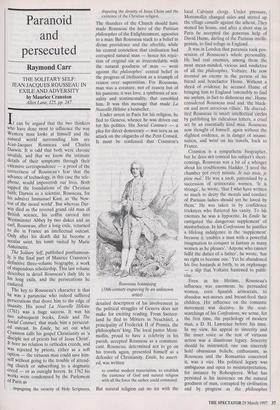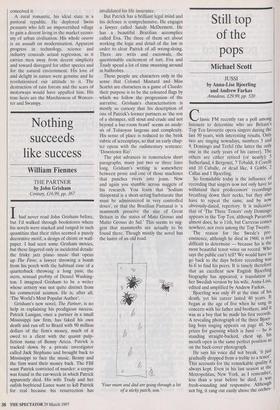Paranoid and persecuted
Raymond Carr
THE SOLITARY SELF: JEAN JACQUES ROUSSEAU IN EXILE AND ADVERSITY by Maurice Cranston Allen Lane, VS, pp. 247 1.11.111••••-- It can be argued that the two thinkers Who have done most to influence the way Western man looks at himself and the natural world surrounding him are Jean-Jacques Rousseau and Charles Darwin. It is odd that both were chronic invalids, and that we know the intimate details of their symptoms through their extensive correspondence — a proof of the correctness of Rousseau's fear that the advance of technology, in this case the tele- phone, would impoverish our lives. Both Sapped the foundations of the Christian faith; Darwin as a scientist, Rousseau, for his admirer Immanuel Kant, as the New- ton of the moral world'. But whereas Dar- win died as the revered grand old man of British science, his coffin carried into Westminster Abbey by two dukes and an earl, Rousseau, after a long exile, returned to die in France an intellectual outcast. Only after his death did he become a secular saint, his tomb visited by Marie Antoinette.
The Solitary Self, published posthumous- ly, is the final part of Maurice Cranston's definitive three-volume biography, a work of stupendous scholarship. This last volume describes in detail Rousseau's daily life in his long exile, and the persecutions he endured.
The key to Rousseau's character is that he was a paranoiac who indeed suffered persecutions that drove him to the edge of insanity. His novel La Nouvelle Helase (1761) was a huge success. It was his two subsequent books, Emile and The Social Contract, that made him a persecut- ed outcast. In Emile, he set out what Cranston calls his gospel Christianity as 'a disciple not of priests but of Jesus Christ'. It bore no relation to orthodox creeds, and Was rejected by priests, either as a soft option — the virtuous man could save him- elf without going to the trouble of attend- ing church or subscribing to a dogmatic creed — or as outright heresy. In 1762 his works were condemned by the Parlement of Paris as
impugning the veracity of Holy Scriptures, disputing the divinity of Jesus Christ and the existence of the Christian religion.
The thunders of the Church should have made Rousseau the hero of the Parisian philosophes of the Enlightenment, agnostics to a man. But Rousseau stuck to a belief in divine providence and the afterlife, while his central conviction that civilisation had corrupted natural man — hence his rejec- tion of original sin as irreconcilable with the natural goodness of man — went against the philosopher' central belief in the progress of eivilisation as a triumph of reason over superstition. For Rousseau, man was a creature, not of reason but of his passions; it was love, a symbiosis of sex- uality and sentimentality, that ennobled him. It was this message that made La Nouvelle fleloese a bestseller.
Under arrest in Paris for his religion, he fled to Geneva, whence he was driven out for his politics. His Social Contract — a plea for direct democracy — was seen as an attack on the oligarchs of the Petit Conseil. It must be confessed that Cranston's Rousseau botanising (18th-century engraving by an unknown artist) detailed description of his involvement in the political struggles of Geneva does not make for exciting reading, From Switzer- land he fled to ?Vilifiers in Neuchatel, a principality of Frederick II of Prussia, the philosophers' king. The local pastor Mont- mollin, proud to have a celebrity in his parish, accepted Rousseau as a communi- cant. Rousseau, determined not to go on his travels again, presented himself as a defender of Christianity. Emile, he assert- ed, was written
to combat modern materialism, to establish the existence of God and natural religion with all the force the author could command.
But natural religion cut no ice with the local Calvinist clergy. Under pressure, Montmollin changed sides and stirred up the village canaille against the atheist. They stoned his house, and after a short stay in Paris he accepted the generous help of David Hume, darling of the Parisian intelli- gentsia, to find refuge in England.
It was in London that paranoia took pos- session of Rousseau's whole personality. He had real enemies, among them the most mean-minded, vicious and vindictive of all the philosophes, Voltaire, He now invented an enemy in the person of his friend and benefactor Hume. Without a shred of evidence he accused Hume of bringing him to England `ostensibly to find me asylum, in fact to dishonour me'. Hume considered Rousseau mad and `the black- est and most atrocious villain'. He discred- ited Rousseau in smart intellectual circles by publishing his ridiculous letters, a cruel act by an essentially kind man. Rousseau now thought of himself, again without the slightest evidence, as in danger of assassi- nation, and went on his travels, back to France.
Cranston is a sympathetic biographer, but he does not conceal his subject's short- comings. Rousseau was a bit of a whingcr about his troublesome bladder. 'I need the chamber pot every minute. Je suis triste, je pisse mai.' He was a snob, patronised by a succession of aristocratic women. `It is strange', he wrote, `that I who have written so much to decry the morals and conduct of Parisian ladies should yet be loved by them.' He was taken in by confidence tricksters who flattered his vanity. To his enemies he was a hypocrite. In Emile he castigated 'the dangerous supplement' of masturbation. In his Confessions he justifies a lifelong indulgence in the 'supplement' because it 'enables a man with a powerful imagination to conquer in fantasy as many women as he pleases'. 'Anyone who cannot fulfil the duties of a father', he wrote, `has no right to become one.' Yet he abandoned his five bastards at birth, to an orphanage — a slip that Voltaire hastened to publi- cise.
Even in his lifetime, Rousseau's influence was enormous; he persuaded women, even Spanish aristocrats, to abandon wet-nurses and breast-feed their children. His influence on the romantic movement was decisive. In the soul- searchings of his Confessions, we sense, for the first time, the psychology of modern man, a D. H. Lawrence before his time. In my view, his appeal to sincerity and the inner voice as the test of virtuous action was a disastrous legacy, Sincerity should be mistrusted; one can sincerely hold obnoxious beliefs; enthusiasm, as Rousseau and the Romantics conceived it, was a vice. His political legacy was ambiguous and open to misinterpretation, for instance by Robespierre. What has persisted is his insistence on the natural goodness of man, corrupted by civilisation and by progress as the philosopher
conceived it.
A rural romantic, his ideal state is a pastoral republic. He deplored Swiss peasants who left an impoverished village to gain a decent living in the market econo- my of urban civilisation. His whole oeuvre is an assault on modernisation. Apparent progress in technology, science and industry conceals actual regression, as it carries men away from decent simplicity and toward disregard for other species and for the natural environment. His love of and delight in nature were genuine and he revolutionised our attitude to it. The destruction of rain forests and the scars of motorways would have appalled him. His true heirs are the Marchioness of Worces- ter and Swampy.



































































 Previous page
Previous page